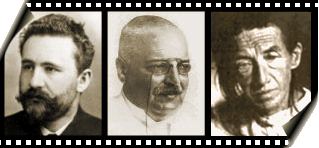
Emil Kraepelin Alois Alzheimer Auguste Deter
In 1907, Alois Alzheimer working in the lab of Emil Kraepelin, presented the brain findings on his patient, Auguste Deter, a woman who had died after developing dementia at age 51. Besides general brain shrinkage, there were characteristic microscopic findings: plagues in the extracellular spaces and neurons with neuro·fibrillary tangles in the cytoplasm.
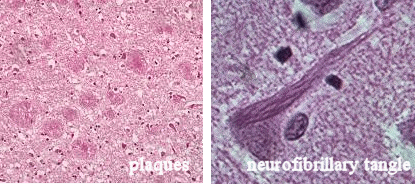
Plaques were known from cases of senile dementia, but the tangles were felt to be a unique finding in pre·senile dementia. Kraepelin immortalized his colleague after Alzheimer’s untimely death by using his name in his classification. When I was a medical student, I was taught that the term Alzheimer’s Disease was reserved for the pre·senile cases, but in recent times, that distinction has fallen by the wayside – so Alzheimer’s Disease is a progressive dementia with characteristic brain findings.
There are a number of neurodegenerative diseases with distinguishing features listed in the DSM-5: Alzheimer’s disease, Frontotemporal lobar degeneration, Lewy body disease, Vascular disease, Traumatic brain injury, Substance/medication use, HIV infection, Prion disease, Parkinson’s disease, Huntington’s disease, Another medical condition, Multiple etiologies, Unspecified. In the case of Alzheimer’s, the diagnostic feature has formerly only be seen at autopsy, though there are apparently scans and other tests becoming available for antemortem diagnosis. There is a rare form that runs in families with a genetic marker and the findings are seen in the dementia that can develop with Down’s Syndrome. Since there’s no sure diagnosis in life, the DSM-5 provides probable and possible variants.
APA approval of DSM-5 is a sad day for psychiatry.Psychology Today: DSM5 in Distressby Allen Frances MDDecember 2, 2012
This is the saddest moment in my 45 year career of studying, practicing, and teaching psychiatry. The Board of Trustees of the American Psychiatric Association has given its final approval to a deeply flawed DSM 5 containing many changes that seem clearly unsafe and scientifically unsound. My best advice to clinicians, to the press, and to the general public – be skeptical and don’t follow DSM 5 blindly down a road likely to lead to massive over-diagnosis and harmful over-medication. Just ignore the ten changes that make no sense…
The motives of the people working on DSM 5 have often been questioned. They have been accused of having a financial conflict of interest because some have [minimal] drug company ties and also because so many of the DSM 5 changes will enhance Pharma profits by adding to our already existing societal overdose of carelessly prescribed psychiatric medicine. But I know the people working on DSM 5 and know this charge to be both unfair and untrue. Indeed, they have made some very bad decisions, but they did so with pure hearts and not because they wanted to help the drug companies. Their’s is an intellectual, not financial, conflict of interest that results from the natural tendency of highly specialized experts to over value their pet ideas, to want to expand their own areas of research interest, and to be oblivious to the distortions that occur in translating DSM 5 to real life clinical practice…
[3] The everyday forgetting characteristic of old age will now be misdiagnosed as Minor Neurocognitive Disorder, creating a huge false positive population of people who are not at special risk for dementia. Since there is no effective treatment for this ‘condition’ [or for dementia], the label provides absolutely no benefit [while creating great anxiety] even for those at true risk for later developing dementia. It is a dead loss for the many who will be mislabeled.
PLoS Medicineby Lisa Cosgrove and Sheldon KrimskyMarch 13, 2012
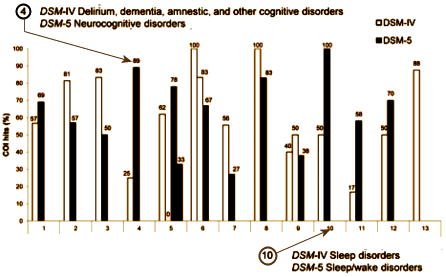
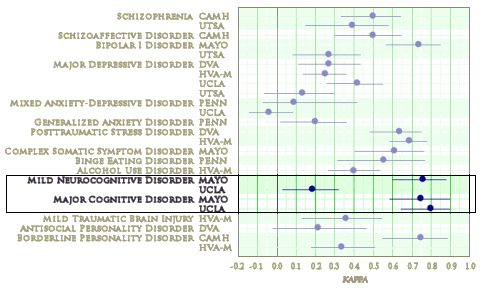
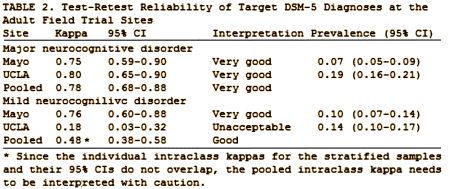
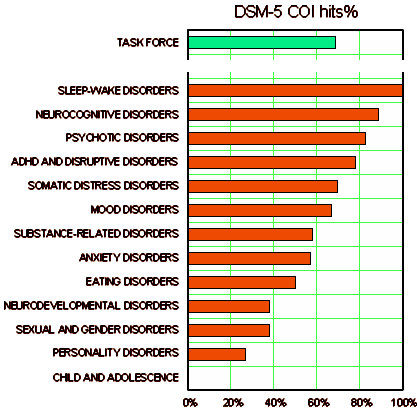
As a guy who ran and was part of a Geriatric Psychiatry and Memory Disorder Clinic for 15 years I can tell you that there is ample reason for mild neurocognitive disorder. In at least 20-30% of our referral base the general question was whether the patient had a progressive dementia. Even with autopsy findings it is controversial. Is it really ethical to tell a patient that this is Alzheimer’s disease when there is a significant level of uncertainty? That certainly happens when the diagnosis is arrived at in 20 minutes and the patient is put on an acetylcholinesterase inhibitor. What threshold would you use? Even the most advanced research designs using the pure NINCDS-ARDA criteria for AD always shows a significant number of patients who has a different or uncertain brain process at autopsy.
I have assessed patients who were assessed who were misdiagnosed with AD or were told that they had a progressive dementia. One of the most valuable services that geriatric psychiatrists can provide is close follow-up of patients with possible dementia and delirium diagnoses to see if they can recover. For that clinical scenario and others there is no better diagnosis than mild neurocognitive disorder. The diagnosis is also relevant in addiction settings when cognitive impairment is present and may clear in several months.
I see it as part of trying to address all of the patient’s problems in treatment planning as well as an adequate treatment plan. The argument could easily be made that it may prevent unnecessary treatment with ACEIs, but that requires a high quality treatment scenario.
related
http://www.madinamerica.com/2014/07/pharma-linked-panel-advises-wider-use-statins-even-drugs-links-dementia-re-affirmed/
Pharma-linked Panel Advises Wider Use of Statins Even as Drugs’ Links to Dementia Re-affirmed
July 19, 2014
People who take statins are at “significantly greater” risk of memory impairment than those who don’t take the popular cholesterol-lowering drugs, according to research reported by Internal Medicine News. Lead University of New South Wales medical researcher Dr. Katherine Samaras presented her team’s findings at a joint meeting of the International Congress of Endocrinology and the Endocrine Society. Meanwhile, the UK National Institute for Health and Care Excellence, even amidst widely publicized concerns about its panel members’ strong ties to pharmaceutical companies, has issued new guidelines suggesting that anyone deemed to have just a 10% risk of developing heart disease over the next 10 years should be seriously considered for long-term statin therapy.
Earlier this year the Sunday Express reported on the conflicts of interest involved in the process of developing the UK National Institute for Health and Care Excellence guidelines on statins: “A Sunday Express investigation has discovered eight out of 12 members of the [National Institute for Health and Care Excellence] panel which drew up the guidance have financial ties to companies that make statins or next generation cholesterol lowering drugs.”
Samaras’ research involved multi-year neuropsychometric testing on 377 people who were 70-90 years old and who had been taking statins for 2-22 years, and on 301 controls with similar physical conditions who had never taken the drugs. Her team found “significantly greater decline in memory” among statin users at both 2 and 4 years. “Previous stroke was significantly associated with an even greater memory decline among statin users,” reported Internal Medicine News. “The findings add weight to the Food and Drug Administration’s warning about statin use and memory loss in 2012.”
Scandal of experts who rule on NHS statins but get paid by drugs firms (Sunday Express, March 9, 2014)
Lipid modification: cardiovascular risk assessment and the modification of blood lipids for the primary and secondary prevention of cardiovascular disease (UK National Institute for Health and Care Excellence, July 2014)
Statin use linked to memory decline in elderly (Internal Medicine News, July 10, 2014)
Statin Use but Not Metabolic Syndrome Is Associated with Cognitive Decline in the Elderly: The Sydney Memory and Ageing Study (Samaras, Katherine et al. Endocrine Society Conference Proceedings Abstracts, 2014.)
Wow Steve, thanks for posting the link on the statins. As I keep trying to tell folks on the MIA site, the situation with over-prescribing meds transcends psychiatry even they have good reason to not have a favorable impression of the profession due to their traumatic experiences with involuntary commitment.
Thank you for this determined investigative work. There is stacks of smoke here, and I daresay we’ll soon see the fire. Re: this comment “I see it as part of trying to address all of the patient’s problems in treatment planning as well as an adequate treatment plan” – honestly, do we really, really need another “label” (which creates a disease, which creates a meds market for that disease) to acknowledge cognitive difficulties and do what we can to improve our patients lives? Using that “label” as an “illness” in fact hides the differences between eg delirium, withdrawal, meds s/e’s, and the myriad other causes. It will lead to “stopping there” at the label, NOT better medical care.
jamzo,
You stole my thunder, well done. Your link is better than my information. What I remember is a few years ago as the statin patents were running out pharma made the statement that since dementia was caused by a plaque build up in the brain the natural and only conclusion was to prescribe a statin. This new use would then allow an extension of their patient.
We also had the issue of cholesterol levels in children, ignoring the issue of this as a source of brain function and a child’s need to have increased levels to assist in growth.
One doctor at the time mockingly stated; if this stuff is so good we should put it in the water.
Mickey has noted trying to deal with the more is better and we never take away a medication problem with his patients. Statins are now given to everyone as a function of age. How many patients are being denied a healthy and active life style by this standard?
Steve Lucas
Dr. Purssey, sometimes you accept a “benign” diagnosis to counter being labeled by physicians with a more serious one that you don’t have. My twist on defensive medicine.
Not that I like this situation at all, but until diagnosis is forefront instead of shotgun treatments, what’s a patient to do.
Yes, Jamzo, that’s why I refuse to take them and plan to make sure the word “refuse” appears in my medical records with “permanent muscle cramp” and “permanent severe memory loss” and “muscle wasting”.
I’m quitting smoking, and am now tapering off amitriptyline which raises the risk of heart attack by 35% and will accept the risks of dying without a drug to kill me or cause another horrific problem.
What percentage of diseases being treated with pharmaceuticals today are caused by pharmaceuticals?
In this case? Maybe as much of a third of the “dementia” out there is caused in whole or in part by prescription drugs.
This article by pharmacist Armon B. Neel in the AARP magazine is an excellent start on the problem. I’m glad it’s become one of their most-read pieces: Ten Drugs That Can Cause Memory Loss.
http://www.aarp.org/health/brain-health/info-05-2013/drugs-that-may-cause-memory-loss.html
Let’s face it, the “neurocognitive disorders” of aging are a growth area and the hyenas know it.
These diagnoses are in the DSM to stake out territory for “neurocognitive disorder” drugs, proven or not, to be prescribed for vague symptoms prophylactically, chronically, and widely — just like antidepressants and antipsychotics have been prescribed.
Knowing what I know now, if I start to lose it and can’t defend myself from medicine by staying one step ahead of its received wisdom, I would kill myself rather than fall into the hands of psychiatry.
Perish the thought, Altostrata. Though, before I discovered that it was baclofen and not MS that was making me a pain-feeling zombie, it did comfort me that I live in a state that allows physician assisted suicide.
There are actions that can be taken and networking that can be done to lower the odds of ending up at the mercy of psychiatry. Now, I have a friend who would go to the ends of the earth to protect me; but I need to seek out more options as all psychiatric survivors should do. We need to hedge our bets.
We can talk about the diagnostic value of an outlier, but I’ve seen this movie before. There is no doubt that there will be a push to medicate normal cognitive decline with aging.
BTW depending on how it is defined, just about anyone over 60 can qualify. Look at the age adjusted norms on the Trails and finger tapping tests.
But that’s how you hold capitalism accountable…with facts…you do not have to take or prescribe a drug…you do have to comply with laws…